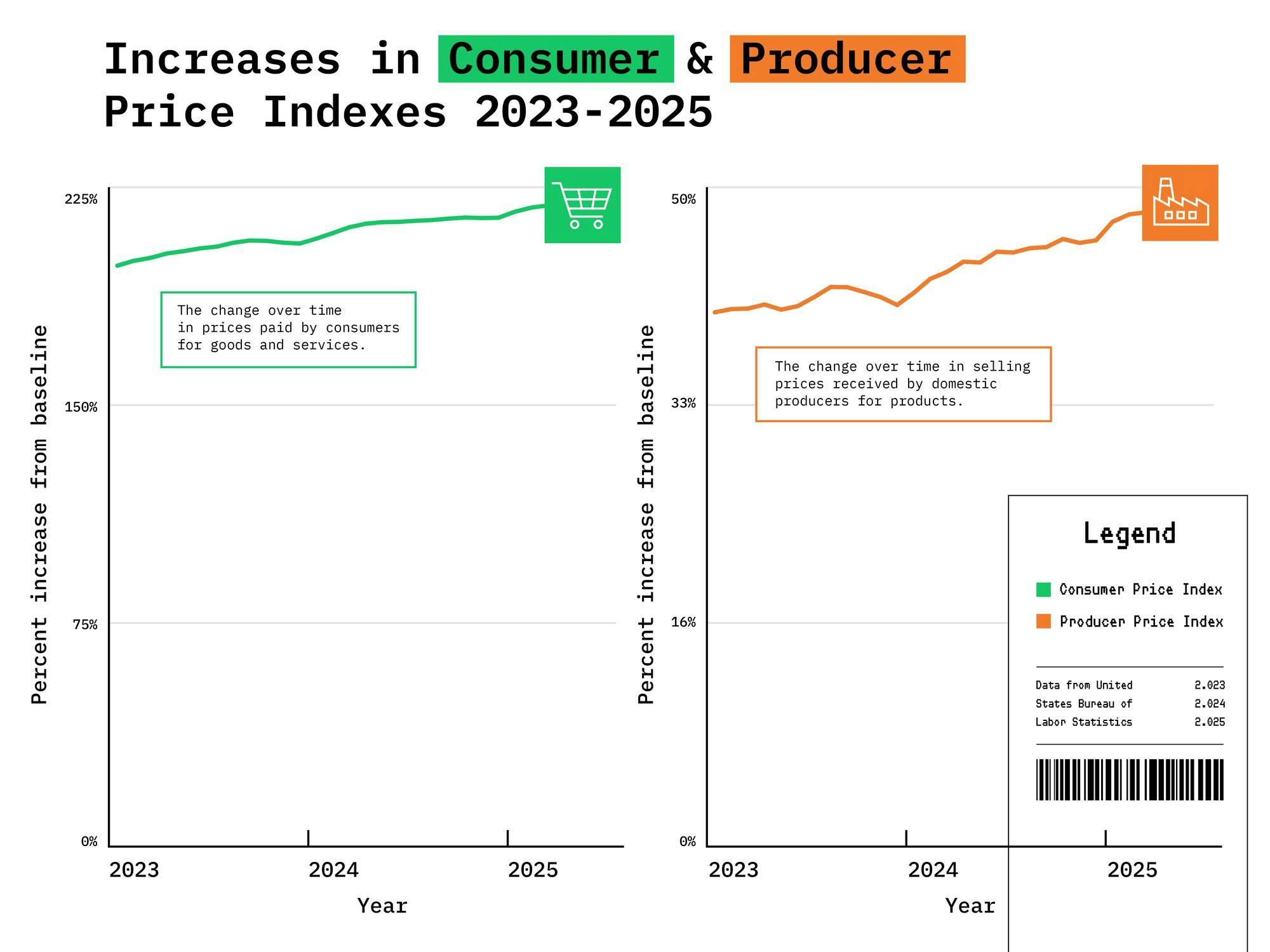Read more from The Alligator's "Ripple Effects" special section here.
Business has become a question of scraping past the bottom line for Tripp Pomeroy.
As the owner of Sweetwater Organic Coffee Company in Gainesville, Pomeroy is one of many local business owners seeing smaller profits and less supplies since the Trump administration imposed sweeping tariffs in January.
“It was already hard. It was already a cash crunch. And it was a scramble from crop to cup,” Pomeroy said.
It’s not even about making a profit anymore; it’s just trying to break even, he said. It’s become a mounting task that feels out of range. With all the brusque changes to the tariff rates, he said, he finds the new policies random and contradictory, leaving him unsure how to implement changes to his business.
A federal appeals court ruled on Aug. 29 that most of President Donald Trump’s recent tariffs are not legal under the acts Trump cited. The Trump administration responded on Sept. 3 with a request for the Supreme Court to appeal the decision.
The federal court said the executive power Trump used to enact the new taxes doesn't allow tariffs at this scale. For now, the tariffs will stay in place until October.
On Aug. 27, the administration increased tariffs on imports from India and Brazil to 50%, while Canada’s rate was raised from 25% to 35% in July, according to BBC. National security tariffs set in June put a 50% tax on steel and aluminum, according to Congress.

“It's usually people on most modest incomes who see it first,” Pomeroy said.
Sweetwater has been in business for 15 years, he said, and it’s part of a co-op made up of 21 different roasters in the U.S. and Canada.
All members of the co-op import coffee directly from farmer-owned cooperatives in Central and South America and Ethiopia. Since the tariffs, Pomeroy said, the co-op has lost upwards of $600,000.
“We have to be stewards to the small-scale farmers and their co-ops, stewards to the environment, stewards to our wholesale customers and stewards to the people who drink our coffee,” he said.
Pomeroy said their biggest challenge locally has been easing the transitions between price points to make the shifting environment more stable for their wholesale customers.
The company has transitioned to dynamic pricing, reassessing costs monthly to keep up with the changing taxes. That includes maintaining regular financial analysis and open communication with customers, he said.
“I feel like we just got to keep our nose down,” Pomeroy said. “Do the work. Do the right thing, do the work that needs to be done.”
However, the prices will keep going up, said Mark Flannery, a UF finance professor emeritus.
While the price of every item on the grocery aisle won’t see a jump, anything imported from outside the U.S. will increase, on average, according to Flannery.
The tariffs will drive production in the U.S. and increase jobs and wealth, but ultimately, he said, some goods that are impractical to produce domestically will become more expensive.
“In that sense, the standard of living of American consumers is going to be reduced by the tariffs,” Flannery said.
These tariffs have people’s attention, he said, and in that way, they were successful. The implementation of the tariffs is forcing international markets to adjust, but the long-term effects may be more far-reaching.
With less international trade of U.S. goods, Flannery said, the value of the dollar goes down. And for the U.S. consumer, the price of imported goods will continue to rise.
The upheaval caused by the tariffs lies largely in how they impact supply chains, he said. This is intensified at a local level.
While larger corporations may be able to rearrange their supply lines or can afford the higher taxes, it’s a harder task for the everyday businessperson, he said.
“The little guy is going to have more trouble being competitive, being efficient, surviving in the economic environment,” Flannery said.
Prashant Patel, owner of the international market India Bazaar in Gainesville, said his supply chains have also suffered over the past months. His prices keep going up while his supply diminishes.
The shop has lost business, and as expenses go up and profit margins go down, Patel’s shelves have emptied.
India Bazaar offers various goods of Asian and Middle Eastern origin, including spices, candies, fruits, vegetables and dry goods. Patel said 75% to 80% of what he sells comes from India.
The price he pays to keep up his supply is where he’s been hit the hardest by the tariffs.
The store hasn’t been able to keep its regular stock, he said. He often needs to direct customers to alternatives. Sometimes, he added, he doesn’t have any replacements for what customers are looking for.
“They learn to live without the stuff that we don't have,” Patel said.
Whether or not this situation continues depends on the Supreme Court, according to Larry DiMatteo, the Huber Hurst professor of Legal Studies at UF’s Warrington College of Business.
The tariffs have become a matter of both trade and presidential power, DiMatteo said. Executive orders allowed Trump to enact his tariff agenda instantly without approval from Congress or the federal courts. Lower courts have struck down other executive orders. But, he added, when the tariffs reach the Supreme Court, it will be a test of the court’s favorability toward Trump.
Legally, the terms the tariffs rest on are incredibly vague, DiMatteo said. He added that it is up to the Supreme Court to make the decision, as there is no precedent surrounding the laws used to justify the tariffs.
“I think this is a huge test for the Supreme Court, because they’d probably side with Trump,” DiMatteo said. “But at what cost to the rule of law? I think it would be a high cost.”
Enacting tariffs through executive powers doesn’t guarantee a permanent fixture, he said. Executive orders are fast-acting, but they don’t often survive the administration that imposed them.
However, DiMatteo said, most of the tariffs’ long-term effects are yet to be seen.
“So who's really paying the tariff? It is the foreign exporter or the American consumer,” DiMatteo said. “And ultimately, it'd be silly not to argue that those tariffs won't trickle down to the consumer.”
Contact Kaysheri Haffner at khaffner@alligator.org. Follow her on X @kaysheri_h.

Kaysheri is a junior journalism student and the Fall 2025 politics reporter for the enterprise desk at the Alligator. She previously worked as the criminal justice reporter. Off the clock she enjoys creative writing, and can always be found at either the gym or curled up with a good book.






